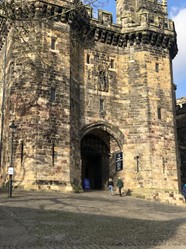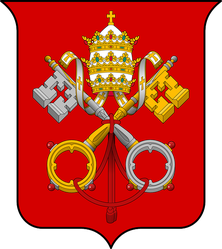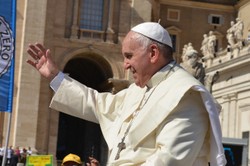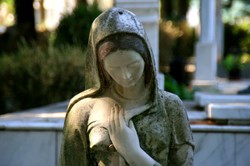Being a Catholic in seventeenth century England was no picnic. The penalty for your love of the mass could be death or imprisonment, and refusal to take an oath to accept the monarch as head of the church was high treason punishable by death by hanging, drawing and quartering, a process that I will not describe on a family site. Thus, it was when Father John Thewlis [Thules] set off for England in the early seventeenth century after completing his priestly formation in Rome he was fully aware of the fate that might await him and anyone who assisted him, the fate that met his assistant Roger Wrenno [Wrennall] the subject of this article.
Thewlis had been born in 1568 at Upholland in Lancashire, a pleasant piece of land slightly elevated above the then swampy lands of South Lancashire, but left at fifteen to train as a priest in Rome. Ordained at twenty four he made his way back to England where he was to begin his priestly mission.
After a short ministry Thewlis was arrested and imprisoned in Wisbech Castle, but whether through skill or incompetence by jailers he escaped. It may be that certain jailers were sympathetic to the old faith and were aware that the holy men whom they were imprisoning were a far cry from the hardened criminals who were the normal denizens of their dungeons and so left doors conveniently open. Bribery cannot be excluded. Thules headed for his native Lancashire, a hotbed of the old faith and a thorn in the side of the government. It was there that he met with Roger Wrenno, a layman and a poor weaver, but a completely dedicated Catholic who risked all to be the priest's assistant.The two men formed a dedicated team and ministered for some years in the heart of North-West England's hotbed of Catholicism, ministering in the area of Central Lancashire centred on Chorley.But success brings danger, and soon their work came to the attention of William Stanley, the Earl of Derby, fanatical Protestant who hated Catholicism.. Thewlis and Wrenno were taken and deposited in Lancaster Castle, where Thewlis continued his priestly ministry, converting four criminals to the faith. Thewlis and Wrenno were heading for real danger.




 Darkness over the Earth the skies darkened when Jesus was crucified14 days ago
Darkness over the Earth the skies darkened when Jesus was crucified14 days ago
 TheThousand Year Gardenon 11/26/2025
TheThousand Year Gardenon 11/26/2025
 Women of the Gospelson 10/11/2025
Women of the Gospelson 10/11/2025
 Religious Gardenson 08/25/2025
Religious Gardenson 08/25/2025



Comments
Thank you!
The last paragraph advises us that "It is a Christian belief that God privileges the simple with special blessings. Maybe God decided that he would honour the simple faith and great steadfastness of this very ordinary, in the sight of the world, man. We do not know the details of what he saw, perhaps they y were beyond mere words."
The last sentence calls to mind my favorite, the silent Marian miracle in Knock village.
Might being "beyond mere words" apply there?
Nothing would have happened.wordle
The second paragraph to the second subheading, Dungeons and interrogation, mentions John Thewlis resisting a bribe from godson William Ash.
What might have happened to that godson for failing in his "mission" to alter his godfather from faithful to faithless?
Lancaster Castle, where the execution took place.
The image to the left of your title is clear. But my image searches leave me still unknowing about what and where the building is!
Internet images suggest that it isn't the place of imprisonment, at Wisbech Castle.
What and where would the building be?
I think that both Thulis and Wrenno are rare surnames. They are Lancashire names,just as beswick is, so they tend to cluster in the North West.
Spellings in the seventeenth century were erratic, and Thewlis was sometimes known as Thules. For comparison Beswick was Beacswyke. I suspect that the actor whose surname is Thewlis might have a genetic connection to the martyr.
Thewlis does not appear among common surnames on the west side of the Atlantic pond. Is it rare on your side?
Would actor David Wheeler, who goes by his mother's maiden name Thewlis, be descended from a John Thewlis ancestor, relative or sibling?
There were spectators at the execution who heard Wrenno's response to the sherrif's pondering aloud as to why the victim seemed so eager to die. The story was spread and eventually reached Catholics in Europe who recorded and preserved it.
How was the account of an apparent vision witnessed? Did he address those gathered.